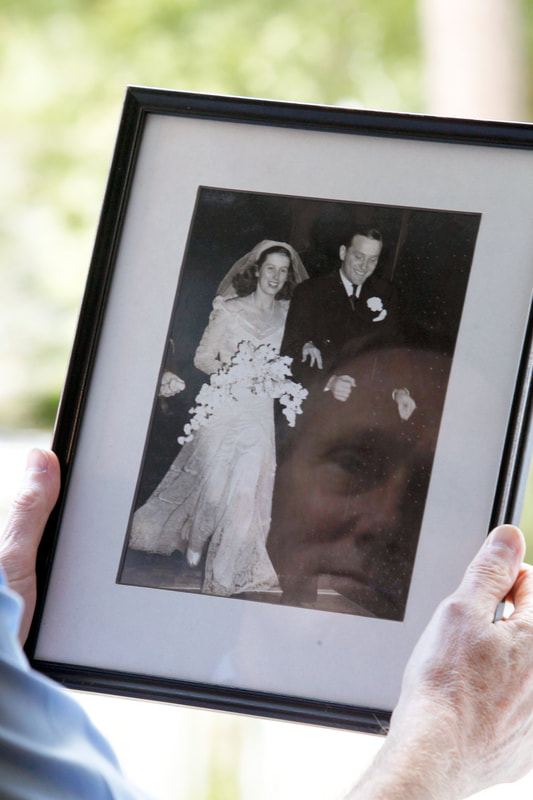"This openness and resolve paved the way for genuinely heartfelt, loving, liberating discussions." Getting Ready for DepartureFor reasons I still do not fully understand, I wanted to know what my parents wanted for their end of life. What I learned in shepherding my parents on their journeys is that the discussions, while hard and sad, are also incredibly liberating and rewarding. The feeling of control and certainty were ironically comforting since I was certain I was going to be losing my parents. But knowing precisely what each of my parents wanted and sharing that with my siblings long before we needed to face the event became a wonderful, loving gift. When the time came (Dad died in August 2009 and Mom died in March 2011) there were no questions or regrets; we all knew exactly what needed to be done.
When I first started pressing the issue, probably 10-12 years before the events, my parents were dismissive of the need. As time moved on, they became evasive and would change the subject. Finally, after many aborted attempts, we broke through and started to talk in earnest. But why did it take so long? |
Here is why I believe they resisted. My parents were fiercely independent and had a work ethic that required one to “buck up” and fight through whatever the issue they were facing. They did not want to be reliant on or a burden to anyone. Finally, I think they didn’t want to burden their children, or anyone else, with their issues. They were very private, and they did not wish to have anyone intruding into their space. I believe all these feelings are normal and caused avoidance and deflection. Only when it became apparent that some things were going to have to change due to physical limitations, and when my siblings and I told my parents that we needed to know how the movie ended, that we began to have the productive end of life discussions.
My parents had raised five children and, while we had our differences and spats, we all loved one another and got along well. We talked and visited often. As my parents aged, they named me and my brother, Alec, executors of their estate. My parents did all the right things concerning wills, powers-of-attorney, DNRs, and all the legal, rational, and biological decisions. In that regard, we were blessed.
However, as their lives wound down, it became clear to me that the emotional and biographical elements of their end of life were still unknown to us. As I was living in the same town, I had access to my parents, and I took it upon myself to explore those aspects of their end of life. I kept my brothers and sister informed at every step, and they helped encourage my parents to open up about their wishes. I believe my parents needed to hear from all of us that we were okay with them having these discussions. We all became very philosophical that we had to have these discussions. This openness and resolve paved the way for genuinely heartfelt, loving, liberating discussions.
These hard, emotional discussions paid off handsomely at my parents’ end of life. When those times came, there were no surprises. None of us had to wonder what our parents wanted. Our parents knew that we were comfortable with the inevitability. Both of my parents were able to identify the right time and circumstance for their deaths. They were ready to accept hospice services, and we all had beautiful long, loving goodbyes, without regret for what hadn’t been said. They both died peacefully. I believe their knowing that they had prepared themselves and their children for the inevitability changed everyone’s experience for the better.
So, don’t wait until it is too late. Don’t miss the opportunity to take control of this event. Have the discussions you need to have. Make these declarations ahead of time. You can do it.
Here are some thoughts from my siblings and my journey to help with yours.
Don’t wait – Since death is inevitable, why not talk about what you think and feel about that inevitability?
Talk early – Dealing with these discussions at the last minute, during highly stressful episodes, does not help matters at all. As morbid as it sounds, the best time to have these discussions is when you feel the most alive. Being reasonably sure the specter of death is some time off relieves some of the stress the topic inevitably brings.
Talk often – People can change their minds. Don’t feel pressured only to talk once and resolve all the issues.
Write it down – Whatever decisions you come to, as parent or child of parents, write them down.
Share it – Share these thoughts with everyone who needs to know.
My experience of shepherding my parents to the end of their lives turned out to be one of the most loving and rewarding chapters in my life. I hope hearing that will give you the courage to have these most important conversations.
My parents had raised five children and, while we had our differences and spats, we all loved one another and got along well. We talked and visited often. As my parents aged, they named me and my brother, Alec, executors of their estate. My parents did all the right things concerning wills, powers-of-attorney, DNRs, and all the legal, rational, and biological decisions. In that regard, we were blessed.
However, as their lives wound down, it became clear to me that the emotional and biographical elements of their end of life were still unknown to us. As I was living in the same town, I had access to my parents, and I took it upon myself to explore those aspects of their end of life. I kept my brothers and sister informed at every step, and they helped encourage my parents to open up about their wishes. I believe my parents needed to hear from all of us that we were okay with them having these discussions. We all became very philosophical that we had to have these discussions. This openness and resolve paved the way for genuinely heartfelt, loving, liberating discussions.
These hard, emotional discussions paid off handsomely at my parents’ end of life. When those times came, there were no surprises. None of us had to wonder what our parents wanted. Our parents knew that we were comfortable with the inevitability. Both of my parents were able to identify the right time and circumstance for their deaths. They were ready to accept hospice services, and we all had beautiful long, loving goodbyes, without regret for what hadn’t been said. They both died peacefully. I believe their knowing that they had prepared themselves and their children for the inevitability changed everyone’s experience for the better.
So, don’t wait until it is too late. Don’t miss the opportunity to take control of this event. Have the discussions you need to have. Make these declarations ahead of time. You can do it.
Here are some thoughts from my siblings and my journey to help with yours.
Don’t wait – Since death is inevitable, why not talk about what you think and feel about that inevitability?
Talk early – Dealing with these discussions at the last minute, during highly stressful episodes, does not help matters at all. As morbid as it sounds, the best time to have these discussions is when you feel the most alive. Being reasonably sure the specter of death is some time off relieves some of the stress the topic inevitably brings.
Talk often – People can change their minds. Don’t feel pressured only to talk once and resolve all the issues.
Write it down – Whatever decisions you come to, as parent or child of parents, write them down.
Share it – Share these thoughts with everyone who needs to know.
My experience of shepherding my parents to the end of their lives turned out to be one of the most loving and rewarding chapters in my life. I hope hearing that will give you the courage to have these most important conversations.
More about Willy
Willy is an educator, author, businessman, systems thinker, husband, father, friend, and son who likes to think deeply and longitudinally about ideas big and small.
Dr. William (Willy) Donaldson is Assistant Professor of Management at Christopher Newport University. Willy has over 35 years of experience as a Board member and President and has been CEO of 8 companies including a publicly traded company and an international joint venture. Willy is the Founder and President of Strategic Venture Planning, a management-consulting firm that assists boards, investors, and senior management teams maximize results. His experience runs from start-up to Fortune 500 companies, from private to public companies, from services to manufacturing, from low to high-tech, and from for profit to not for profit entities.
He is the author of Simple_Complexity: A Management Book for the Rest of Us: A Guide to Systems Thinking
Dr. William (Willy) Donaldson is Assistant Professor of Management at Christopher Newport University. Willy has over 35 years of experience as a Board member and President and has been CEO of 8 companies including a publicly traded company and an international joint venture. Willy is the Founder and President of Strategic Venture Planning, a management-consulting firm that assists boards, investors, and senior management teams maximize results. His experience runs from start-up to Fortune 500 companies, from private to public companies, from services to manufacturing, from low to high-tech, and from for profit to not for profit entities.
He is the author of Simple_Complexity: A Management Book for the Rest of Us: A Guide to Systems Thinking

